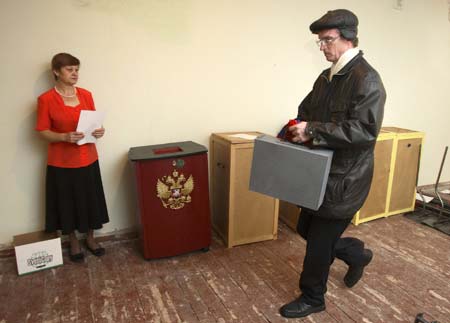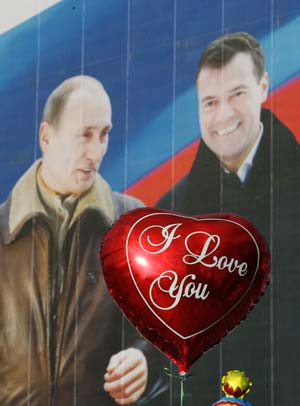Russia's far eastern region of Kamchatka first kicked off on Sunday the presidential election in which four candidates are vying to replace President Vladimir Putin, who is constitutionally barred from a third consecutive term.

A local election official (R) carries ballot boxes for the coming presidential elections in Russia's Siberian town of Divnogorsk, 38km (24 miles) from Krasnoyarsk, Feb. 28, 2008. (Xinhua/Reuters Photo)
Though having been hit by a strong cyclone and snow in recent days, all of the 203 polling stations in Kamchatka opened at 8 a.m. local time on Sunday (2000 GMT) as scheduled, while the other parts of the Russian territory still have to wait for several hours to vote. The polling stations will close at 8 p.m. local time.
Oliga Alexandra, a 52-year-old lady who came before the polling station started its work, was the first to cast her ballot at the No. 64 polling station located at a natatorium of the city.
"I hope the new president will bring new reforms to our country and make our life better," Oliga told Xinhua, but refusing to tell who she is voting for.
Snowfall has temporarily stopped in this city but strong wind is still roaring. The ground was covered by the amount of snow that would normally be an average monthly precipitation. Snow has already been removed from most of the main streets and walled at roadsides up to 2 to 3 meters high.
Local electoral official said on Saturday that they would "mobilize all forces to have the roads to polling stations cleared on Sunday."
Four candidates are running for the highest post of the country: First Deputy Prime Minister Dmitry Medvedev, nominated by the ruling United Russia party, Communist leader Gennady Zyuganov, Liberal Democratic Party leader Vladimir Zhirinovsky and Andrei Bogdanov, the leader of the Democratic Party.

A balloon is seen in front of an election poster showing Russian President Vladimir Putin and presidential candidate Dmitry Medvedev in Moscow, Russia, March 1, 2008. Russia's presidential election will be held on March 2.(Xinhua Photo)
Promising candidates have to win more than 50 percent vote to get the highest post of the nation. Otherwise, a run-off will be held between the top two candidates.
The Central Election Commission (CEC) said there are around 108.94 million eligible voters who will go to 96,301 polling stations scattered around the vast country on Sunday and among which, 364 polling stations are opened in 142 countries for Russian citizens aboard.
In some remote areas voting started about two weeks before the election date.
Since Russia spans 11 time zones, the people in Kaliningrad, a Russian enclave located between Poland and Lithuania will be the last on the Russian territory to stop casting their ballots at 1800 GMT on Sunday.
Though there is no minimum threshold for voter turnout in the election, the CEC predicted a high voter turnout which will surpass 68.5 percent.
Over 200 observers from international organizations, including the Commonwealth of Independent States, the Shanghai Cooperation Organization and the Council of Europe's Parliamentary Assembly, will monitor the vote.
However, Europe's main election watchdog, the Organization for Security and Cooperation in Europe, decided to boycott the election because of Moscow-imposed restrictions.
The CEC will publish preliminary results at 10:00 a.m. Monday (0700 GMT), and final results will be announced on Friday.
(Xinhua News Agency March 2, 2008)